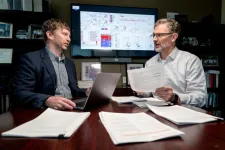(Press-News.org) New research from UC Santa Cruz is finally giving you the go-ahead to sing in the shower as loud as you want. Because, as it turns out, you probably sound pretty darn good.
Psychologists wanted to study “earworms,” the types of songs that get stuck in your head and play automatically on a loop. So they asked people to sing out any earworms they were experiencing and record them on their phones when prompted at random times throughout the day. When researchers analyzed the recordings, they found that a remarkable proportion of them perfectly matched the pitch of the original songs they were based upon.
More specifically, 44.7% of recordings had a pitch error of 0 semitones, and 68.9% were accurate within 1 semitone of the original song. These findings were recently published in the journal Attention, Perception, & Psychophysics.
“What this shows is that a surprisingly large portion of the population has a type of automatic, hidden ‘perfect pitch’ ability,” said Cognitive Psychology Ph.D. candidate Matt Evans, who led the study with support from Psychology Professor Nicolas Davidenko and undergraduate research assistant Pablo Gaeta.
“Interestingly, if you were to ask people how they thought they did in this task, they would probably be pretty confident that they had the melody right, but they would be much less certain that they were singing in the right key,” Evans said. “As it turns out, many people with very strong pitch memory may not have very good judgment of their own accuracy, and that may be because they don’t have the labeling ability that comes with true perfect pitch.”
Evans explained that true perfect pitch is the ability to accurately produce or identify a given note on the first try and without a reference pitch. Less than 1 in 10,000 people possess that ability, with the list including famed musicians like Ludwig van Beethoven, Ella Fitzgerald, and Mariah Carey. But, scientists are increasingly finding that accurate pitch memory is much more common.
Prior research has shown that participants in laboratory settings who are asked to recall a well-known song and sing it from memory end up singing it in the right key at least 15% of the time, which is much more often than could be expected by chance. But there are still a lot of unknowns about how this memory process works, and that included questions about whether it took deliberate effort for people to recall songs in the right key, or if it happened automatically.
That’s where earworms came in handy. Because earworms are a type of musical memory experience that happens involuntarily, the UC Santa Cruz team decided to use them to test whether pitch memory was still relatively accurate when music wasn’t being recalled purposefully. The team’s findings that earworms did in fact very strongly follow the key of the original song suggests that there may be something unique about musical memories and the ways they are encoded and maintained inside our brains.
“People who study memory often think about long-term memories as capturing the gist of something, where the brain takes shortcuts to represent information, and one way our brains could try to represent the gist of music would be to forget what the original key was,” explained Professor Davidenko. “Music sounds very similar in different keys, so it would be a good shortcut for the brain to just ignore that information, but it turns out that it’s not ignored. These musical memories are actually highly accurate representations that defy the typical gist formation that happens in some other domains of long-term memory.”
As researchers continue working to unpack the mechanisms behind musical memory, Evans says he hopes the current findings will also help more people have the confidence to participate in music. He noted that the pitch accuracy of participants in the study was not predicted by any objective measures of singing ability, and none of the participants were musicians or reported having perfect pitch. In other words, you don’t have to have special abilities to demonstrate this foundational musical skill.
“Music and singing are uniquely human experiences that so many people don’t allow themselves to engage with because they don’t think they can, or they’ve been told they can’t,” Evans said. “But in reality, you don’t have to be Beyonce to have what it takes to make music. Your brain is already doing some of it automatically and accurately, despite that part of you that thinks you can’t.”
END
Singing from memory unlocks a surprisingly common musical superpower
2024-08-15
ELSE PRESS RELEASES FROM THIS DATE:
A call to bridge the cancer care – chronic illness management gap
2024-08-14
Providing cancer care for someone who also has a chronic illness, such as diabetes or high blood pressure, requires a systematic, co-management approach to produce better cancer and overall health outcomes, said UNC Lineberger Comprehensive Cancer Center’s Samuel Cykert, MD.
Cancer patients with a chronic illness often experience poorer outcomes. This is especially true for Black patients. Contributing to this disparity, studies show, is the increased likelihood that people with chronic illnesses may not be offered standard cancer treatments like surgery, chemotherapy or radiation. If they do start standard treatment, they might not complete it due to complications from ...
The American Ornithological Society (AOS) announces its 2024 award winners for achievements in ornithological research, service, conservation, and publication
2024-08-14
CHICAGO—August 14, 2024—Each year, the American Ornithological Society (AOS) confers awards on individuals and groups for their ornithological research and notable contributions to the science and practice of ornithology, and for their service to the society. Our 2024 awardees represent outstanding contributions to the scientific study and conservation of birds and to the AOS. The 2024 recipients will accept their awards at the AOS annual meeting (AOS 2024) in Estes Park, Colorado, in October.
“Our award winners this year epitomize the excellence in research, publications, service, and conservation in ornithology towards which we all strive in our profession,” ...
New research from Children’s Hospital of Philadelphia and St. Jude poised to transform approach to diagnosing and treating acute leukemia in children
2024-08-14
Researchers at Children’s Hospital of Philadelphia (CHOP), St. Jude Children’s Research Hospital (St. Jude) and the Children’s Oncology Group (COG) today announced a significant paradigm shift in the understanding of T-lineage acute lymphoblastic leukemia (T-ALL), an aggressive and high-risk form of cancer, to one frequently driven by genetic changes in non-coding portions of our DNA. The collaborative study, supported by the Gabriella Miller Kids First Pediatric Research Program (Kids First) and National Institutes of Health (NIH) Common Fund, was published ...
New clue into the curious case of our ageing immune system
2024-08-14
A WEHI study could help solve a long-standing mystery into why a key immune organ in our bodies shrinks and loses its function as we get older.
The thymus is an organ essential for good health due to its ability to produce special immune cells that are responsible for fighting infections and cancer.
In a world-first, researchers have uncovered new cells that drive this ageing process in the thymus – significant findings that could unlock a way to restore function in the thymus and prevent our immunity from waning as we age.
Watch and embed the video: https://youtu.be/2x1UGqNh77w
At a glance
The thymus is an organ essential for our immune defence ...
Venting your frustrations can make friends like you better – if you do it right
2024-08-14
Key takeaways
Venting about your frustrations with one friend to another may feel good, but it doesn’t necessarily reduce anger.
Experiments showed that people who listened to a friend vent liked and supported that person more than those who were vented about — but only if the person venting didn’t derogate or seem aggressive toward the other friend.
Venting might be an effective tool of competition for listeners’ affections precisely because it is not readily recognized as a tool of competition.
Venting about your frustrations with one friend to another isn’t necessarily cathartic, but it can make the friend you’re talking to like and ...
Phase 1 BAFF CAR T clinical trial for patients with relapsed and refractory multiple myeloma underway at UH Seidman Cancer Center
2024-08-14
CLEVELAND – University Hospitals (UH) Seidman Cancer Center hematologist-oncologist Leland Metheny, MD, is leading the trial. He says in the two years since the foundational pre-clinical work was completed, the team has shown that it’s feasible to manufacture BAFF CAR T-cells for human subjects. The innovation is introducing genes into T-cells via the process of electroporation in the Wesley Center for Immunotherapy at UH Seidman Cancer Center.
In January 2022, a research team from UH Seidman Cancer Center and Case Western Reserve University published a groundbreaking ...
Microscopic packets could deliver diabetes-preventing therapeutics
2024-08-14
Within each of us lies an army of cells whose topmost duty is protecting against external pathogens and internal threats such as proliferating cancer cells. Yet, immune cells can sometimes erroneously attack the body, causing autoimmune diseases like type 1 diabetes.
Texas A&M researchers recently received an RO1 grant from the National Institutes of Health to develop a strategy to deliver immune-suppressing proteins generally produced by specialized stem cells. Such an approach could potentially help reduce the immune system's attack on the insulin-producing beta-cells in the pancreas and open doors to a novel treatment for type 1 diabetes.
"We are excited that the ...
New brain-computer interface allows man with ALS to ‘speak’ again
2024-08-14
A new brain-computer interface (BCI) developed at UC Davis Health translates brain signals into speech with up to 97% accuracy — the most accurate system of its kind.
The researchers implanted sensors in the brain of a man with severely impaired speech due to amyotrophic lateral sclerosis (ALS). The man was able to communicate his intended speech within minutes of activating the system.
A study about this work was published today in the New England Journal of Medicine.
ALS, also known as Lou Gehrig's disease, affects the nerve cells that control movement ...
International study detects consciousness in unresponsive patients
2024-08-14
New research co-led by experts at Mass General Brigham found that brain scans can detect consciousness in some patients with brain injury who are unresponsive.
In the study, 241 participants with severe brain injury who do not respond when given a simple instruction were assessed with functional MRI (fMRI), electroencephalography (EEG), or both tests. During these tests, participants heard instructions, such as “imagine opening and closing your hand” followed, 15-30 seconds later by “stop imagining opening and closing your hand.” The fMRI and EEG brain ...
Manard chosen for Society of Applied Spectroscopy’s Lester W. Strock Award
2024-08-14
Benjamin Manard, an analytical chemist in the Chemical Sciences Division of the Department of Energy’s Oak Ridge National Laboratory, will receive the 2024 Lester W. Strock Award from the Society of Applied Spectroscopy.
The prize is named for the late Lester W. Strock, a crystal chemist and pioneer in applied spectroscopy. The annual award recognizes researchers who produce outstanding publications in analytical atomic spectrochemistry.
“Manard’s publications over the last five years demonstrate a clear focus on the elemental and isotopic analysis of nuclear materials using a variety ...




